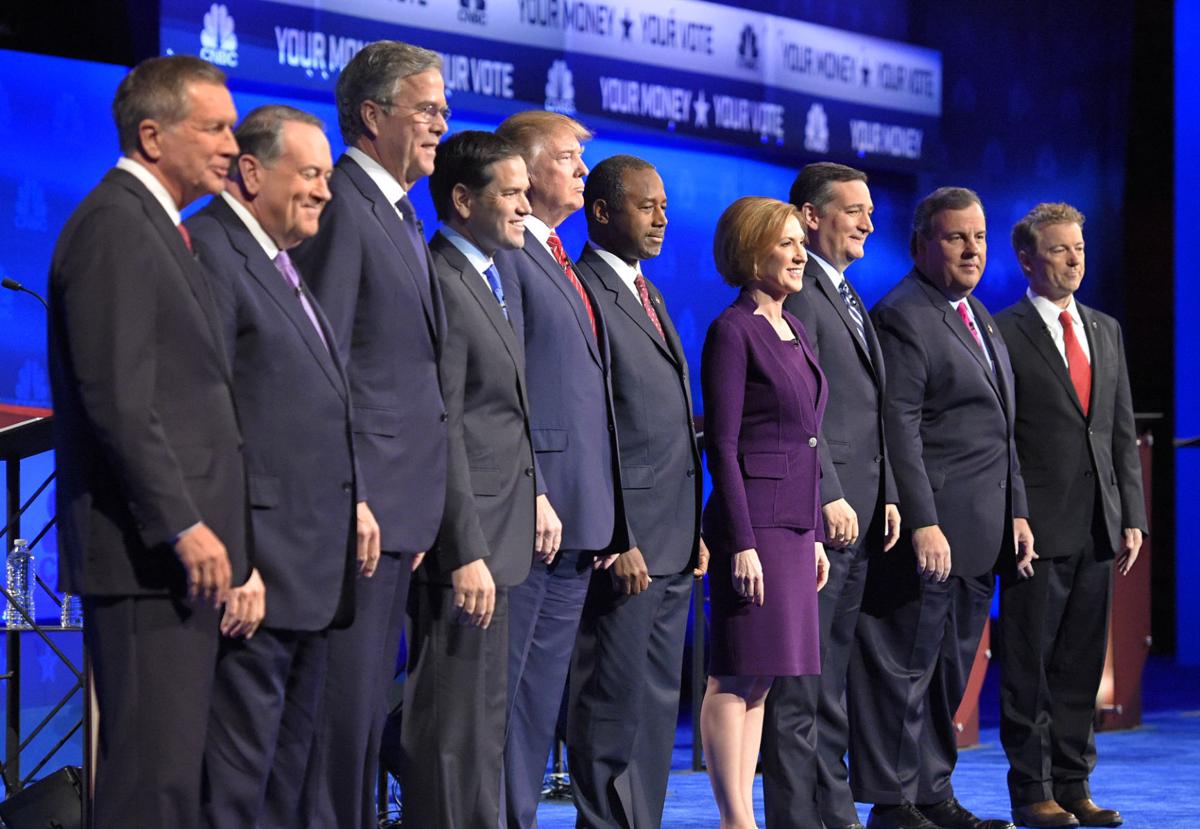This week, we’re converting my Friday column to an all-politics format.
I’ll be writing this Political Notebook weekly at least through the general election. Some of my colleagues will be contributing tidbits to the notebook as we wend our way through this so-far bizarre election season.
Early voting has begun in Arizona’s presidential preference election, and Republicans have 14 names to consider as they fill out their ballot in advance of the March 22 deadline.
Rick Santorum tops a list that also includes Jeb Bush, Rand Paul, Mike Huckabee, Chris Christie and Lindsey Graham and ends with Ben Carson. They’ve all dropped out or are poised to, in Carson’s case.
It’s a lot of wasted ballot space when everyone knows only one name really matters: Trump.
Will Republicans vote for Donald Trump or against him?
This year, at least, it appears Arizona voters’ opinions will matter. In the past, the contest was often over by the time the campaign came here.
And here as around the country, Trump’s early wins are sending out seismic shock waves that could affect everything from down-ticket races to personal relationships.
After Mitt Romney lashed out against Trump Thursday morning, Sen. John McCain also saw fit to distance himself. It’s probably not a coincidence that McCain’s likely general-election opponent, Rep. Ann Kirpatrick, put out an ad Monday tying McCain to Trump. In a statement, McCain said he shared Romney’s concerns and added:
“I want Republican voters to pay close attention to what our party’s most respected and knowledgeable leaders and national security experts are saying about Mr. Trump, and to think long and hard about who they want to be our next commander-in-chief and leader of the free world.”
A similar statement was not exactly welcome at the Pima County Republican meeting this week. Carolyn Cox, the former party chair, asked people to investigate Trump’s record before voting for him.
My colleague Joe Ferguson, who attended the meeting, said it turned into a bit of an argument as at least one Trump supporter shouted her down.
“I’m just telling people to listen to the debates, look at the websites,” Cox told me Thursday afternoon, adding that she still doesn’t know who she’ll vote for.
Trump’s emergence may yet alter the race in Southeastern Arizona’s second congressional district as well. State Rep. Bruce Wheeler told me earlier this month that he’d decide whether to jump into the Democratic nomination race after Super Tuesday, and that he’d probably get in if Trump or Sen. Ted Cruz were winning.
Now he’s decided to wait till after the March 15 primaries in Ohio and Florida.
“Even at this point, with all this stop-Trump momentum, there’s still the possibility they may stop him,” Wheeler said.
That, he figures, would hurt Democrats’ chances.
The other Democrats in the race, Victoria Steele and Matt Heinz, have called on Republican Rep. Martha McSally to state her position on Trump. When I tried to reach her Thursday, McSally was on a flight back to Tucson.
Opposition to Miller?
Talk around Tucson spiked this week suggesting that someone will run in the Republican primary against incumbent Pima County Supervisor Ally Miller.
Miller, as you probably know, has been a controversial figure in her first term on the board. Some Republicans love her for taking on the county’s power structure, specifically administrator Chuck Huckelberry.
But others are uncomfortable with an approach they consider unproductively confrontational. One of the potential candidates, attorney Amy Hernandez, confirmed to me Thursday that she may run.
“I’ve been asked to consider that,” she said. “No decisions have been made, of course.”
First, she said, she’ll be talking with other potential candidates, and she won’t run if there’s another candidate moving forward. One or two other Republicans appear to be considering it, she said.
On the Democratic side, Brian Bickel is planning to run for the seat in the general election.
LD2 race heats up
One of the more interesting local races will be for the state House seats in Legislative District 2. That district runs from Tucson’s south side down to the border at Nogales.
Republican Chris Ackerley and Democrat Rosanna Gabaldon hold the two seats. Each party can have two candidates in the general election, since there are two House seats per district. But there will be at least three Democrats in the primary, including Gabaldon.
Well-known Sunnyside School Board president Daniel Hernandez has announced he’s running, and so has an unknown UA law school student named Aaron Baumann.
Baumann, 25, grew up in Phoenix, he told me Thursday, but is a descendant of the Capin family, which has been important in Nogales-area commerce for generations. On Jan. 31, he reported $19,285 in contributions, far more than any other contender.
He’s hoping for support from U.S. Rep. Raul Grijalva, whose endorsement could make a big difference for any of the candidates.
Prayer wars go on
On Thursday, Rep. Juan Mendez once again gave an invocation at the state House, speaking from his secular humanist perspective. It appears to have been a setup.
Mendez, a Democrat, was scheduled in advance to give the invocation, but when he was done Rep. Steve Montenegro, the House majority leader, stood and objected that the invocation did not include reference to the word God, as new House rules require.
Montenegro just happened to have an evangelical Christian preacher on the floor, Wheeler told me Thursday, and called on him to give a new invocation that, yes, included the word God.
These embarrassing prayer wars have been going on for years now. Mendez gives good-faith, inclusive invocations that are not religious, and some conservative Christian members object. I wrote about a similar outbreak in 2013.
Rep. David Gowan, a Southern Arizonan and speaker of the House, has been known as open and respectful to political minorities such as Democrats in the House. It would be good if he extended the same spirit to religious minorities and nonbelievers, too.





